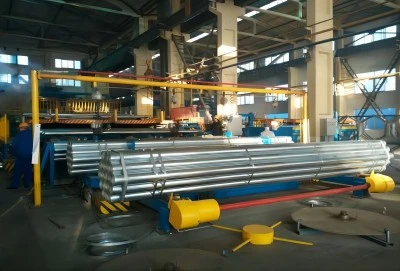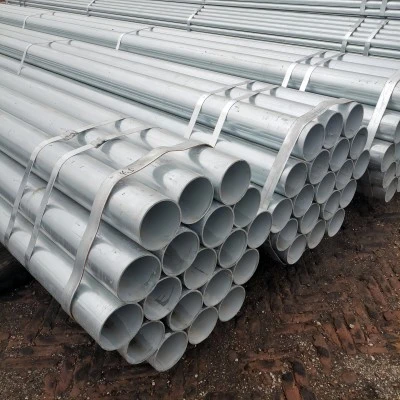Yes, you can weld galvanized steel pipe, but it's not a straightforward process. Galvanized pipes, known for their corrosion-resistant zinc coating, present unique challenges when it comes to welding. The zinc layer, while excellent for protecting the steel underneath, can cause significant safety hazards and affect weld quality if not properly addressed.
|
|
|
Safety concerns: Zinc fumes and precautions
Understanding the dangers of zinc oxide fumes
When welding galvanized steel pipes, the zinc coating vaporizes at high temperatures, producing zinc oxide fumes. These fumes pose serious health risks to welders and nearby workers. Inhaling zinc oxide can lead to metal fume fever, a condition characterized by flu-like symptoms such as fever, chills, and nausea. In severe cases, prolonged exposure may cause respiratory issues and even damage to the nervous system.
The danger of zinc fumes is particularly relevant in confined spaces or poorly ventilated areas, which are common in pipeline construction and industrial settings. Project managers and safety officers must be aware of these risks and implement appropriate safety measures to protect their workforce.
Essential personal protective equipment for welders
To mitigate the risks associated with welding galvanized steel pipes, proper personal protective equipment (PPE) is non-negotiable. Welders should wear: - Respiratory protection: NIOSH-approved respirators with appropriate filters for metal fumes - Eye protection: Welding helmets with auto-darkening lenses - Protective clothing: Fire-resistant coveralls and gloves - Foot protection: Steel-toed boots to guard against falling objects
For large-scale projects, especially in offshore platform construction or bridge structures, investing in high-quality PPE is essential for maintaining worker safety and project efficiency.
Proper ventilation techniques for galvanized welding
Adequate ventilation is crucial when welding galvanized steel pipes. Implementing effective ventilation systems helps disperse zinc fumes and other harmful gases. Some recommended techniques include: - Local exhaust ventilation systems placed near the welding area - Portable fume extractors for mobile welding operations - Natural ventilation through strategic placement of fans and open windows (where applicable) - Regular air quality monitoring to ensure safe working conditions
In large industrial settings or confined spaces, such as those found in water supply systems or oil and gas transportation projects, engineered ventilation solutions may be necessary to maintain safe air quality levels.
Alternatives to welding galvanized steel
Mechanical fastening methods for galvanized pipesFor many applications, mechanical fastening offers a safer and more efficient alternative to welding galvanized steel pipes. These methods preserve the integrity of the zinc coating, maintaining the pipe's corrosion resistance. Common mechanical fastening techniques include: - Bolted flange connections: Ideal for large-diameter pipes in industrial settings - Compression fittings: Suitable for smaller diameter pipes in plumbing systems - Grooved pipe joining systems: Widely used in fire protection and HVAC applications
These methods are particularly relevant for project procurement managers looking to optimize installation time and reduce safety risks associated with welding galvanized materials.
Adhesive bonding options for galvanized steel
Adhesive bonding is gaining popularity as an alternative to welding, especially in industries where maintaining the galvanized coating is crucial. Modern structural adhesives offer: - High strength and durability - Resistance to environmental factors - Even stress distribution across the joint - Ability to join dissimilar materials
For applications in water supply systems or industrial manufacturing where corrosion resistance is paramount, adhesive bonding can be an excellent choice. However, careful selection of adhesives compatible with galvanized surfaces is essential for long-term performance.
Threaded connections: A safer alternative
Threaded connections provide a reliable and safe method for joining galvanized steel pipes, particularly in oil and gas transportation and water supply systems. Benefits of threaded connections include: - Easy installation and disassembly - No need for specialized welding equipment - Preservation of the galvanized coating - Suitability for pressurized systems
When selecting threaded connections, it's crucial to consider factors such as pipe diameter, pressure ratings, and environmental conditions to ensure optimal performance and longevity.
When welding galvanized steel is necessary
Removing zinc coating before welding: Best practicesIn situations where welding galvanized steel pipes is unavoidable, removing the zinc coating from the weld area is crucial. This process, known as de-galvanizing, can be accomplished through several methods: - Grinding: Use a grinding wheel to remove the zinc layer around the weld area - Chemical stripping: Apply zinc removal solutions to dissolve the coating - Thermal stripping: Use a torch to burn off the zinc coating (requires proper ventilation)
It's important to note that these methods may compromise the corrosion resistance of the pipe in the treated area. Plant equipment managers should consider post-weld treatments to restore protection.
Specialized welding techniques for galvanized steel
When welding galvanized steel pipes is necessary, specialized techniques can help minimize zinc fume production and improve weld quality: - Pulse welding: Reduces heat input and zinc vaporization - Cold metal transfer (CMT): Lowers overall heat input into the material - Use of silicon bronze filler metals: Allows for lower melting temperatures
These techniques require skilled welders and specialized equipment, making them more suitable for large-scale engineering projects where the benefits outweigh the additional costs.
Post-weld treatments to restore corrosion resistance
After welding galvanized steel pipes, it's crucial to restore the corrosion protection in the affected area. Common post-weld treatments include: - Zinc-rich paint application - Cold galvanizing sprays - Hot-dip galvanizing of the entire welded assembly (where feasible) - Cathodic protection systems for large-scale installations
The choice of post-weld treatment depends on the specific application, environmental conditions, and project requirements. Consulting with corrosion specialists can help determine the most effective solution for your project.
Welding galvanized steel pipes presents significant challenges, but with proper precautions and techniques, it can be done safely and effectively. For professionals in oil and gas transportation, water supply systems, and industrial manufacturing, understanding the risks and alternatives is crucial. While mechanical fastening, adhesive bonding, and threaded connections often provide safer and more efficient solutions, specialized welding techniques remain valuable for certain applications. By prioritizing worker safety, maintaining structural integrity, and considering long-term corrosion protection, project managers can make informed decisions when dealing with galvanized steel pipes in their engineering projects.
Galvanized Steel Pipes For Sale
Hebei Longma Group offers high-quality galvanized steel pipes for your industrial and construction needs. Our state-of-the-art production facilities, equipped with German-imported technology and four independently developed production lines, ensure superior product quality. With a professional team of over 300 employees, including 60+ technical experts, we guarantee expertise in every aspect of galvanized steel pipe manufacturing. Our comprehensive testing facilities, featuring ultrasonic flaw detectors and industrial X-ray equipment, ensure every pipe meets the highest standards. We pride ourselves on fast delivery, with standard thickness pipes ready in as little as 7 days. All our products come with complete certifications, including API 5L, ISO 9001, ISO 14001, and more. Thanks to our long-term partnerships with raw material suppliers and efficient production processes, we offer competitive prices without compromising on quality. For top-notch galvanized steel pipes tailored to your project requirements, contact us at info@longma-group.com.














